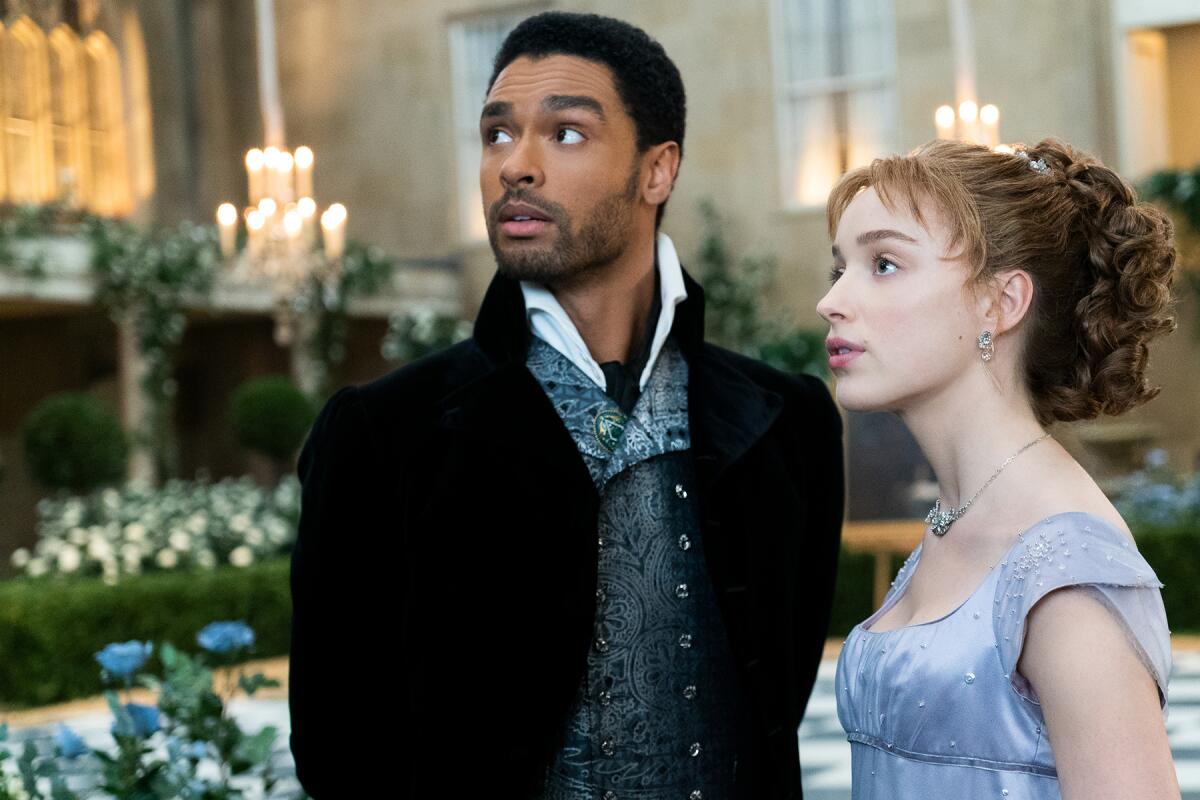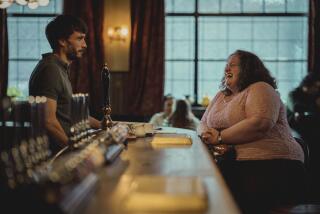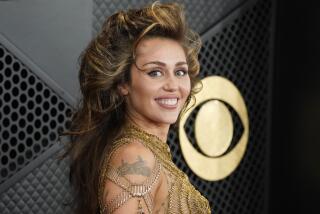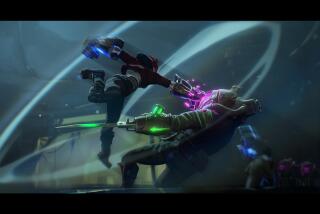‘The Unofficial Bridgerton Musical’ is officially being sued

- Share via
It started off so well. A fan-made TikTok musical tribute to Netflix’s “Bridgerton,” heating up into a lush suite of songs in a concept album with roses from the streamer. The romance blossomed with a record-setting showing at the Grammy Awards.
But oh, how capricious love can be.
Netflix is suing the creators of “The Unofficial Bridgerton Musical” for copyright and trademark infringement following the project’s move to live, paid performances. In court papers filed Friday in the U.S. District Court in the District of Columbia, the streamer claims, “Defendants Abigail Barlow and Emily Bear and their companies (‘Barlow & Bear’) have taken valuable intellectual property from the Netflix original series Bridgerton to build an international brand for themselves.”
It began as love from afar. Barlow, an aspiring pop singer-songwriter, and Bear, a former child prodigy with quite a composing and performance résumé who counts Quincy Jones among her mentors, had been working together on another musical project when they became “Bridgerton” fans. Barlow posted a TikTok video in January 2021 pondering what it would be like if Netflix’s smash hit show (the streamer says it has been watched by 82 million households) were a musical. In the video, she sang a bit of a song she and Bear had written along those lines, incorporating dialogue from the series.
“It was inspired by a line of dialogue in the TV show that really inspired me, and it was basically poetry the way the dialogue is written, so I wrote the first song, ‘Ocean Away,’ and that’s how it came about,” Barlow told Entertainment Weekly that February, after the pair had generated 14 songs in the space of a month.
Then came the meet cute: A swept-off-its-feet Netflix tweeted an excerpt of one of the songs, saying it was “absolutely blown away” by the work Barlow, Bear and company were up to and offering the singers a “standing ovation.”
The whole affair unfolded in the public eye, with Instagram and TikTok posts tracking the songs’ creation and even inviting input from viewers during livestreams. By that September, their work had reportedly been viewed 200 million times on TikTok. The eventual concept album made Billboard’s Top 40 and hit No. 1 on iTunes — and became the first-ever TikTok-generated project to win the Grammy for musical theater album. Barlow (now 20) and Bear (now 23) were the youngest-ever nominees and winners in the category. How magical was their night? Andrew Lloyd Webber tweeted about meeting them and “singalongs round the piano.” It seemed like an all-around love fest.
But oh, how love can turn to hate. And like so many love affairs, this one seems destined to end in court.
In the Friday filing (as posted at Deadline), Netflix stated, “On July 26, 2022, over Netflix’s repeated objections, Barlow & Bear staged a massive, for-profit stage show—entitled ‘The Unofficial Bridgerton Musical Album Live in Concert’—to a sold-out audience at the Kennedy Center, with tickets ranging up to $149 each and VIP packages. The live show featured over a dozen songs that copied verbatim dialogue, character traits and expression, and other elements from Bridgerton the series ... Barlow & Bear misrepresented to the audience that they were using Netflix’s BRIDGERTON trademark ‘with Permission,’ while Netflix vigorously objected.”
The brouhaha contains all the elements of a steamy bodice-ripper: Passion, promises, and allegations of deception and lies.
In the suit, Netflix asserts its “exclusive right to authorize derivative works based on the series” and notes that Barlow and Bear were among many (“countless other fans”) posting tribute content on social media.
“When asked directly, Netflix told Barlow & Bear, time and time again, that such works were not authorized,” the suit continues. “Barlow & Bear chose to move forward with that knowledge and release an album recording, which they titled ‘The Unofficial Bridgerton Musical.’ At each step of the way, Barlow & Bear’s representatives repeatedly assured Netflix that they understood Netflix’s position and led Netflix to believe that Netflix would be consulted before Barlow & Bear took steps beyond streaming their album online in audio-only format ... Barlow & Bear’s representations were false.”
As to those wondering why the streamer didn’t sue earlier, perhaps when the album came out, the lawsuit states: “Barlow & Bear’s attorneys have now taken the position that they somehow do not need a license because Netflix did not file this lawsuit sooner. That is not how copyright law works. Netflix is not required to sue every infringer. Rather, it can make its rights known—which it unambiguously, and repeatedly, did here.”
Additionally, the suit asserts that, when the company learned of the intent to create an album of the songs, “Netflix sought to advise them of a clear line: Netflix representatives stressed to Barlow & Bear’s representative that Netflix would not authorize and did not want them to engage in any live performances (e.g., performances of ‘The Unofficial Bridgerton Musical’) or other derivative works that might compete with Netflix’s own planned live events” such as the streamer’s own “The Queen’s Ball: A Bridgerton Experience.”
Apart from the Kennedy Center performance, the musical has an “in concert” date lined up at the Royal Albert Hall in September.
Netflix seeks the following: “Declaratory relief establishing Netflix’s rights ... Preliminary and permanent injunctive relief ... Damages available under [infringement statutes] ... reasonable attorneys’ fees, costs of suit and interest ... and ... any and all such other and further relief as this Court shall deem just and proper.”
Barlow and Bear hadn’t responded to the suit, nor responded to Times requests for comment, at publication time. The streamer, however, had more to say, in a statement attributed to a Netflix spokesperson: “Netflix supports fan-generated content, but Barlow & Bear have taken this many steps further, seeking to create multiple revenue streams for themselves without formal permission to utilize the Bridgerton IP. We’ve tried hard to work with Barlow & Bear, and they have refused to cooperate. The creators, cast, writers and crew have poured their hearts and souls into Bridgerton, and we’re taking action to protect their rights.”
The show’s creator, Shonda Rimes, issued a statement of her own: “There is so much joy in seeing audiences fall in love with Bridgerton and watching the creative ways they express their fandom. What started as a fun celebration by Barlow & Bear on social media has turned into the blatant taking of intellectual property solely for Barlow & Bear’s financial benefit. This property was created by Julia Quinn and brought to life on screen through the hard work of countless individuals. Just as Barlow & Bear would not allow others to appropriate their IP for profit, Netflix cannot stand by and allow Barlow & Bear to do the same with Bridgerton.”
And Julia Quinn, author of the book series on which the series is based, said, “Abigail Barlow and Emily Bear are wildly talented, and I was flattered and delighted when they began composing Bridgerton songs and sharing with other fans on TikTok. There is a difference, however, between composing on TikTok and recording and performing for commercial gain. I would hope that Barlow & Bear, who share my position as independent creative professionals, understand the need to protect other professionals’ intellectual property, including the characters and stories I created in the Bridgerton novels over twenty years ago.”
More to Read
The complete guide to home viewing
Get Screen Gab for everything about the TV shows and streaming movies everyone’s talking about.
You may occasionally receive promotional content from the Los Angeles Times.







